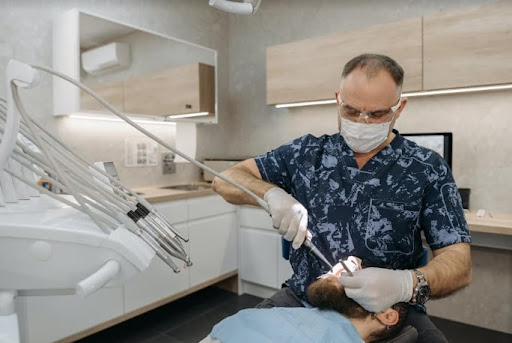5 Ways Having TMJ Disorders Can Affect Your Dental Health
Temporomandibular joint or TMJ disorders can affect your health in many ways, from causing chronic head and neck pain to disrupting your sleep. Not surprisingly, TMJ disorders can also affect your dental health if they are allowed to go unchecked. While it’s always best to talk to your dentist if you have any questions or concerns, let’s go over just some of the ways that a TMJ disorder can affect your dental health.
A Word on TMJ Disorders
Before we get into details about TMJ-related dental health issues, we should discuss just what a TMJ disorder is. The temporomandibular joints or TMJ are the joints that connect the lower jaw to the skull. You have one joint on each side of your lower jawbone, and they are what allow you to open and close your mouth, chew food, and slide your jaw from side to side. A TMJ disorder is anything that can affect the function of these joints. Some of the symptoms of a TMJ disorder include:
- Pain in your jaw
- Aches in and around your ears
- Difficulty chewing
- Pain while chewing
- Locking of the jaw that makes it difficult to open or close your mouth
The cause of a TMJ disorder can be difficult to determine, although some common causes include arthritis, genetics, and injuries to your jaw. Most TMJ disorders are temporary and can be treated, although other cases are chronic and long-lasting. Many people with TMJ disorders are unaware that they have a problem for months or even years, which is why dental health issues are often associated with them.
That said, let’s look at how living with a TMJ disorder can affect your dental health.
1. Bruxism
Bruxism is a condition where you continuously grind or gnash your teeth. Teeth grinding is usually done unconsciously, often in your sleep, and your diet also causes teeth grinding in your sleep. It’s also a common problem for people living with mental disorders. While minor teeth grinding may not be a serious issue, chronic teeth grinding can cause your teeth to wear down and become cracked or chipped. This leads to cavities, tooth decay, and all the problems that go with it. You might have bruxism caused by TMJ disorder if you wake up with a tired or sore jaw in the morning or if your teeth are overly sensitive to cold temperatures.
2. Alignment Issues
When you live with a TMJ disorder, it puts added pressure on your jaw and your teeth. While this may not seem like a serious issue at first, your teeth will eventually adjust to the added pressure by shifting out of alignment. Not only will this affect your appearance as your teeth become crooked, but it will affect your bite and your ability to chew. Misaligned teeth can be fixed with orthodontic treatment, but that won’t fix the underlying problem of your chronic TMJ disorder.
3. Worn Enamel
The enamel is the hard outer layer of your teeth. It protects your teeth from damage and decay, which is why cavities can be such a serious issue. A TMJ disorder can cause you to grind your teeth, especially at night when you are unaware of what you are doing. This can wear down the enamel on your teeth, causing cavities, decay, and a number of other serious issues that will greatly affect your dental health.
4. Cracked and Chipped Teeth
If you have a TMJ disorder that has you grinding your teeth at night, your teeth could become cracked and chipped as you wear down your enamel. This is especially dangerous if you already have cracks and chips in your teeth. The effect becomes not unlike working at a crack in a stone; cavities and chips only become wider and leave you more vulnerable to decay and tooth loss. It can also cause problems if you have fillings or dental implants as these are just as vulnerable to damage as your natural teeth can be.
5. Receding Gums
Gum pain in people with a TMJ disorder is relatively rare, but your gumline can still recede if you don’t address the underlying issue. Gums recede when the bone supporting them weakens, which can happen when you have a TMJ disorder. It can also happen if you lose teeth that decay and need to be extracted due to TMJ disorder. Gums recede gradually, so you might not notice the issue right away, but your regular dentist can diagnose the issue and address the underlying cause.
Treating TMJ Disorders
In many cases, the symptoms associated with TMJ disorders will go away on their own before you develop any serious dental issues. Mild pain and discomfort in your jaw can also be managed by over-the-counter pain medications such as Tylenol or ibuprofen. If the problem doesn’t go away on its own, treatment might involve antidepressants that can control sleeplessness and bruxism, mouth guards to protect against teeth grinding, and physical therapy exercises to strengthen and stretch your jaw muscles. In severe cases, surgical procedures to address underlying problems in the jawbone or joints can be effective. In the meantime, more conventional dental procedures can help repair teeth that have been damaged by TMJ disorder symptoms. These include dental implants, fillings, crowns, and other treatments that you’ve likely had during a trip to the dentist.
TMJ disorders can impact your life in many ways which is why seeking out professional TMJ treatment in Raleigh NC right away is important. They can make it difficult or painful to chew or speak, disrupt your sleep, and leave you with chronic pain. Even though many cases of TMJ disorders go away with time, many others are chronic and will cause serious permanent damage to your teeth. If you suspect that you have a TMJ disorder or your teeth have been damaged by bruxism or other issues, don’t hesitate to speak to your dentist or your primary doctor. There are treatments available, but you need to act quickly before to protect your dental health.
Share this content:














Post Comment